Are You a Good Victim?
– Coach Colle Davis
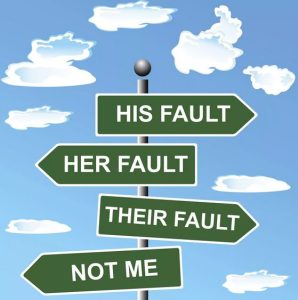
Think for a moment about the last time you played the part of a victim. In other words, a time you complained to elicit sympathy about the state of your business, your marriage, or your unfulfilled life. What was your desired outcome?
You will be hard-pressed to remember what it was because it was unimportant except for one small item. You wanted to have your way. When you didn’t do what you expected, you went straight into victim mode. There is no better place to sulk, feel sorry for yourself, and tell a story than from the dreaded position of ‘The Victim.’
Here is another clue someone is playing the victim card, “I’m sick and tired of this,” or they grind on about a situation that is not going their way.
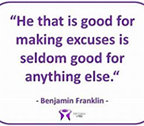 There is a legal definition for ‘making excuses’ in the workplace. Paraphrased, it goes something like this, “One who makes excuses as an excuse for nonperformance in a court setting is used as a basis for exemption or relief from guilt. They profess to have no choice, yet they were driven by necessity.” It’s a flimsy flim-flam defense for being a victim of their perceived circumstances.
There is a legal definition for ‘making excuses’ in the workplace. Paraphrased, it goes something like this, “One who makes excuses as an excuse for nonperformance in a court setting is used as a basis for exemption or relief from guilt. They profess to have no choice, yet they were driven by necessity.” It’s a flimsy flim-flam defense for being a victim of their perceived circumstances.
Life hands everyone a steady stream of opportunities to either step up or whine, “Why me?” The victim’s favorite default is to blame anyone or anything except taking responsibility for their hand in the results and outcomes they are receiving. Being a victim is easy because people will always listen and commiserate over a beer or next to the water cooler, and sometimes they may win points.
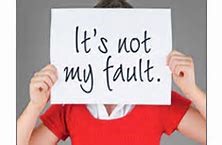 Living in the past or being attached to the past is within the realm of the victim. “Ain’t it awful? How can this happen to me? Life ‘did me wrong.’ See what I had to put up with?” Many Country Western songs are based on victimhood, “She took my dog, my truck, and my love. Poor me.” Sound familiar?
Living in the past or being attached to the past is within the realm of the victim. “Ain’t it awful? How can this happen to me? Life ‘did me wrong.’ See what I had to put up with?” Many Country Western songs are based on victimhood, “She took my dog, my truck, and my love. Poor me.” Sound familiar?
Here is an odd insight from a conversation I had recently. The person speaking was waxing eloquently about their past life, and I suddenly realized we had a great deal in common. Both of us were raised in rural areas.
The transition in my thinking happened in a flash.
Many country people love to be victims, not all, but some. It is in their vernacular, in their history, and marks them as targets for easy manipulations by powerful people who take advantage of their mindset. It’s baked into their minds.
- The government doesn’t care about us folks
- The system is rigged against us because (fill in anything handy)
- We don’t get the same advantages as city folks.
- Our schools are not as good as they could be, so our kids don’t have the same opportunities.
- All the good jobs left here years ago
- It is the (any group different than the whiners) that are taking over.
- I do my best, but it is never good enough.
See how victimhood is maintained? As I said, it’s baked into their minds.
What can one do to short-circuit the whine in your logical brain, saying, “I’m not to blame. I’m the victim here”?
Move to the present. No matter what happened to you in the past, you can only live in the present. Complaining about the past drops you into victim mode. Making the change to focus on positive outcomes for the future IS the behavioral change for no longer being a whiner, and it is tough to accomplish, and you need to decide if the rewards are worth the effort.
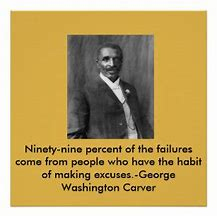 What can one do to short-circuit the whine in your logical brain, saying, “I’m not to blame. I’m the victim here”?
What can one do to short-circuit the whine in your logical brain, saying, “I’m not to blame. I’m the victim here”?
Move to the present. No matter what happened to you in the past, you can only live in the present. Complaining about the past drops you into victim mode. Making the change to focus on positive outcomes for the future IS the behavioral change for no longer being a whiner, and it is tough to accomplish, and you need to decide if the rewards are worth the effort.
Here are some tips to ease the transition from the victim to a self-actuating, strong, confident person.
- Take responsibility for all your actions in real-time.
- Learn to say, “You’re right, I’m wrong,” and move on.
- Stop listening to victim talk from anyone. Do them a favor and ask the person spewing words if they like being a victim. By busting whiners in victim mode, they will hate being busted on their stuff. Expect them to wince or take a step back.
- Look closely at what you think you can gain by being a strong, capable person who is true to themselves and others.
- Figure out what you want for an outcome in every situation, then take a risk and don’t make a single excuse. Be resourceful and find a way to keep your word.
- The past is gone; leave it dead and buried. It has no place in your life now. It’s ashes.
- When you catch yourself whining as a victim, laugh, recalibrate your outcome, and move on to live in integrity with yourself and others.
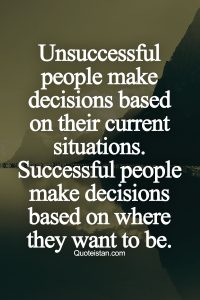 Is this transition easy? No. It’s not.
Is this transition easy? No. It’s not.
It requires focus, dedication, work, and the willingness to act like a mature adult. The best part for the new you are the rewards. You will have more fun, less stress, better caliber friends, improved looks (wrinkles are reduced), and more opportunities.
Victims of catastrophes and wars need our help and support. Those who want to claim to be a victim in normal life are a bad joke that needs exposure as frauds. The less we support them, the quicker the world recovers from whatever happens.
For more tips, tricks, and nudges, contact me.

Colle Davis, Executive Coach. For more help, encouragement, or to turbocharge your life, call or email me. I am a Senior Level Master Coach and Certified Hypnotist with over 30 years of helping corporate clients. Reserve your free twenty-minute Zoom call with me, and your life will never be the same. 804-467-1536 EST cd****@*****ch.com In the meantime, stay safe and have fun.
